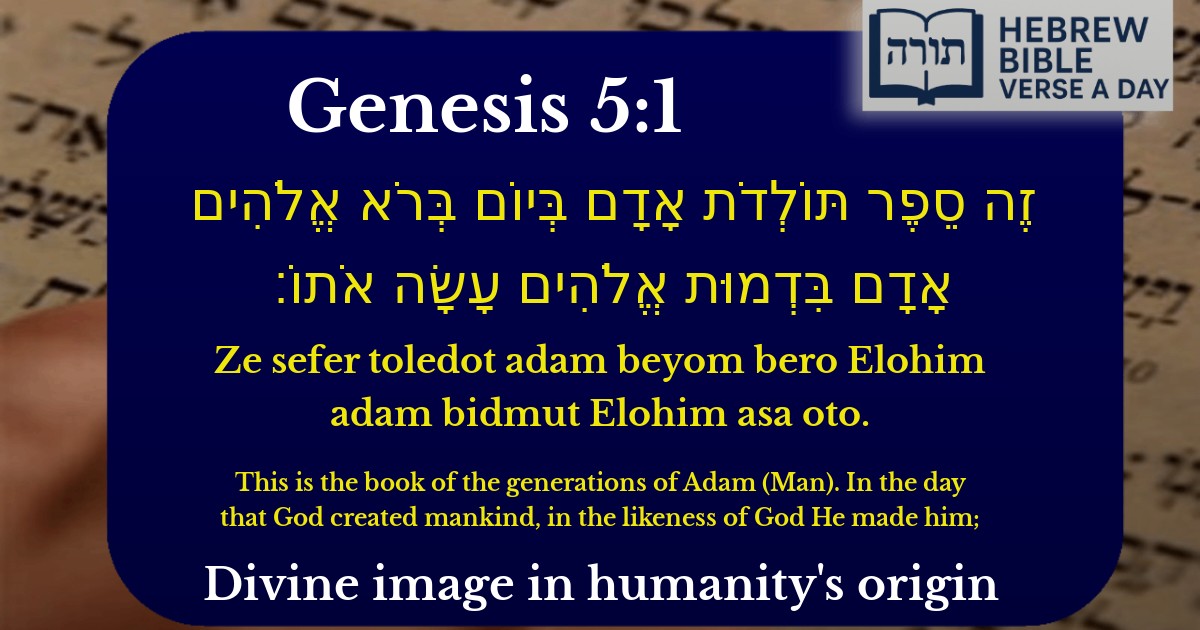Join Our Newsletter To Be Informed When New Videos Are Posted
Join the thousands of fellow Studends who rely on our videos to learn how to read the bible in Hebrew for free!
Hebrew Text
זֶה סֵפֶר תּוֹלְדֹת אָדָם בְּיוֹם בְּרֹא אֱלֹהִים אָדָם בִּדְמוּת אֱלֹהִים עָשָׂה אֹתוֹ׃
English Translation
This is the book of the generations of Adam (Man). In the day that God created mankind, in the likeness of God He made him;
Transliteration
Ze sefer toledot adam beyom bero Elohim adam bidmut Elohim asa oto.
Hebrew Leining Text
זֶ֣ה סֵ֔פֶר<sup class="footnote-marker">*</sup><i class="footnote">(בספרי תימן <big>סֵ֔</big>פֶר בסמ״ך גדולה)</i> תּוֹלְדֹ֖ת אָדָ֑ם בְּי֗וֹם בְּרֹ֤א אֱלֹהִים֙ אָדָ֔ם בִּדְמ֥וּת אֱלֹהִ֖ים עָשָׂ֥ה אֹתֽוֹ׃
זֶ֣ה סֵ֔פֶר*(בספרי תימן סֵ֔פֶר בסמ״ך גדולה) תּוֹלְדֹ֖ת אָדָ֑ם בְּי֗וֹם בְּרֹ֤א אֱלֹהִים֙ אָדָ֔ם בִּדְמ֥וּת אֱלֹהִ֖ים עָשָׂ֥ה אֹתֽוֹ׃
🎵 Listen to leining
Parasha Commentary
📚 Talmud Citations
This verse is quoted in the Talmud.
📖 Eruvin 18a
The verse is referenced in a discussion about the creation of Adam and the nature of humanity being created in God's likeness.
📖 Sanhedrin 38a
The verse is cited in a discussion about the creation of Adam and the significance of humanity being made in the image of God.


Introduction to the Verse
The verse (Genesis 5:1) serves as a transition in the Torah, concluding the narrative of creation and introducing the genealogical record of Adam and his descendants. It emphasizes the divine origin of humanity and the unique spiritual nature of mankind.
The Book of the Generations of Adam
Rashi explains that "זֶה סֵפֶר תּוֹלְדֹת אָדָם" ("This is the book of the generations of Adam") refers to the written record of Adam's descendants, which the Torah proceeds to enumerate. The Midrash (Bereishit Rabbah 24:2) suggests that this "book" may allude to the Torah itself, as it contains the history and destiny of mankind.
Created in the Likeness of God
The phrase "בִּדְמוּת אֱלֹהִים עָשָׂה אֹתוֹ" ("in the likeness of God He made him") is central to Jewish thought. Rambam (Moreh Nevuchim 1:1) explains that this does not imply physical resemblance, as God has no corporeal form, but rather refers to the intellectual and moral capacity unique to human beings. The Talmud (Sanhedrin 38a) elaborates that Adam was created with divine wisdom and free will, enabling him to emulate God's attributes of compassion, justice, and holiness.
The Significance of "In the Day He Created"
The phrase "בְּיוֹם בְּרֹא אֱלֹהִים אָדָם" ("In the day that God created mankind") is interpreted by the Midrash (Bereishit Rabbah 22:2) as emphasizing the immediacy and completeness of Adam's creation. Unlike other creatures, Adam was formed fully developed, with wisdom and purpose from the very first day.
Conclusion: The Dignity of Humanity
This verse underscores the foundational Jewish belief in the sanctity of human life. As the Maharal (Gur Aryeh) explains, being created in God's likeness grants every person inherent dignity and responsibility. The Torah thus begins the genealogy of mankind by reminding us of our divine origin and spiritual potential.